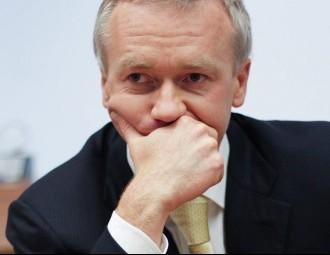Baumgertner’s purgatory in Belarus is over

Uralkalij CEO has finally been extradited to Russian law enforcement officials; while Russian expert thinks that after the “potash war” Belarus has solved most of its economic problems for 2014.
Vladislav Baumgertner, the chief executive of Russian potash producer Uralkalij, has been extradited to Russia. It is said that he was handed over to Russian law enforcement officials on November 21.
The news about his extradition came after Suleiman Kerimov agreed to sell his nearly 22 percent stake in Uralkalij to billionaire Mikhail Prokhorov, RFE/RL recalls, as Aliaksandr Lukashenka had demanded Kerimov sell his stake in Uralkalij as a condition for freeing Baumgertner.
Kirill Koktysh, MGIMO professor and pundit, in the talk with Euroradio about the outcome of Belarus-Russia 'potash war' said that Lukashenka can be considered the winner, even if Uralkalij has not compensated for $100 million of the so-called losses Baumgertner caused for Belarus: "They will pay in other ways. It will affect gas agreements and other contracts… I am sure that everything will be taken into account and compensated. I think that they have already agreed on it. It seems to me that Belarus has already solved most of its economic problems for 2014.”
At the same time, you cannot say that Russia was defeated in the potassium war, the expert thinks. Dmitry Medvedev’s liberal group lost but members of the top brass became stronger. There were rumours circulating in Moscow: people though that Russian members of the top brass made the list of people who had to visit Minsk together with Baumgertner.
Let us recall that Mr. Baumgertner was arrested on August 26 as he was about to fly out of Minsk after a meeting with Belarusian Prime Minister Mikhail Miasnikovich. A few days later, Belarusian authorities instituted criminal proceedings against Russian billionaire and other Uralkalij's top executives. On September 16, Russian Deputy Prosecutor General Aleksandr Zvyagintsev announced that the Investigative Committee of Belarus would hand over the investigation of the criminal case to the Russian Prosecutor General's Office. Later on Minsk City Court rejected an appealagainst district judge's refusal to order the release of Uralkalij CEO; However, later on Vladislav Baumgertner moved to house arrest on the night of 26 September, hours before Russian President Vladimir Putin was scheduled to arrive in Belarus to observe a joint military exercise. Recently Belarus has changed the charges against Vladislav Baumgertner from abuse of office to embezzlement. The Investigative Committee of Russia instituted criminal proceedings against Vladislav Baumgertner on October 14 and Official Kremlin requested his extradition recently. According to the latest news, Onexim Group was likely to acquire Kerimov's stake in Uralkalij; however, Uralkalij dissociates itself from the sale of Kerimov's share.
-
03.01
-
07.10
-
22.09
-
17.08
-
12.08
-
30.09








































